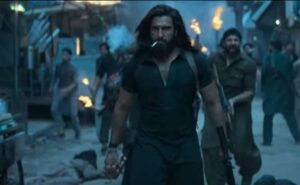
Maren Morris loves to write about driving. There’s something evocative to her about being behind the wheel on an endless open road, regardless of whether there’s even a destination to get to. “I can’t get away from the car,” she says with a laugh. “I’ve spent a lot of time in 15-passenger vans with stinky band dudes. But I really love being alone. It’s my safe space.” So it’s not exactly a coincidence that two of Morris’s lead singles — 2016’s “My Church” and 2022’s “Circles Around This Town” — put the pedal down to evoke her own type of Highway FM. Dreamsicle, her fourth album, released in May, also had that impulse. “Cry in the Car” is a fantastically groovy fuck-off to an ex, in which Morris sings about rolling up her tinted windows to let the mascaraed waterworks flow freely. But another song, “Carry Me Through,” presented itself as the more prophetic choice. “It was a preamble to what was to come in my life,” she tells me. “Oh, you think it’s difficult now? It’s about to get worse.”
The difficulties were plentiful. Morris divorced her husband, fellow country singer-songwriter Ryan Hurd, after five years of marriage. (She now puts the B in LGBTQ+.) She also began to make pointed critiques about the genre’s conservative-leaning politics, opinions of which continue to inflame the old guard. Even the changing landscape of something Morris thought she knew quite well — how to roll out the release of an album — made her challenge her instincts. But she carried herself through it all. “This song was one that I would come back to, listen to, and be like, I need to take my own advice,” Morris says. “That’s why I ended up leading with it. It’s a hopeful message.”
“My Church,” Hero (2016)
The Song
I was driving around Los Angeles with a good friend. It was my first California writing trip. I was inspired by the first time going up the Pacific Coast Highway and listening to music — whatever mix my friend had on, I remember thinking, This is like church to me. Feeling this sense of freedom with no destination and enjoying the moment. The words my church hit me hard, so I wrote it in my Notes app on my phone. The next day, I brought that idea to Busbee, my friend and collaborator. We wrote it in about 45 minutes. Initially, the bridge was going to be “Can I get a hallelujah? / Can I get an amen?” But it was so hooky that we both were like, “I think this has to be the chorus.” Everything was pointing toward that being what the song was centered around: Everyone joins in; it’s this collective consciousness.
Once a writer understands the direction, what comes next is just word vomit. I thought, I have to show right off the bat that the person singing this is flawed. No matter what flaw behooves them, they’re still going to find a way to connect to whatever higher source or to their fellow man or woman. “I’ve cussed on a Sunday” — I thought that was a funny lyric to start the song. I couldn’t stop listening to the demo. I think I listened to it 100 times. I’d just lie in bed in my hotel room and was like, This is crack. It was one of those songs where I felt instantly very protective of it. I had paranoia. I didn’t have a record deal as an artist, so I was like, If an artist hears this, will they want it for themselves? Someone’s going to record this and it’s going to be taken out from underneath me. So I wouldn’t send it to anybody over an email or text. I would only plug in my phone at label offices. You just never know. Nowadays, some songs and ideas get stolen. I’ve seen it happen with friends of mine, so I was probably a little too precious with it, but it worked out the way it was supposed to.
The Bet
I had written “Drunk Girls Don’t Cry” around that time. It felt very fresh and was a messy girl’s take on bringing a friend back up to surface after a breakup. But “My Church” covered a base of maturity that I felt was important to lead with. It’s an ageless concept of faith or non-faith, and music is my touchstone of spirituality.
The Payoff
I was providing a 20-something take on a universal subject. There’s a familiarity to it, but it also feels fresh — like someone hasn’t said quite the same thing before. It was one of those songs where the first second you hear it it’s an identifiable voice. Even if you had never heard of me before, you were like, This doesn’t sound like anyone else. That’s something I had going for me: An original tone. I didn’t sound like anything else on the radio at the time, so your ear latched onto it.
“Girl,” Girl (2019)
The Song
I was going through a lot of self-doubt. I was in that fear mode of a “sophomore slump” after the success of Hero. You have to maintain the bar or raise it. There’s such a pressure of output and quickness to get the next thing out. I was touring so much after Hero that I ended up having to write a lot of my second record on the road. I didn’t love writing during the day on the bus, playing a show at night, and having no time to process anything or recalibrate my emotions from the prior night’s show. I felt pressured to have to constantly be creative and perform. I was just mentally exhausted. I wanted to write a song that felt like I was singing to somebody else, but I was singing to myself.
That was the start of my emotional road of activism. “My Church” really didn’t have anything to prove. I guess a lot of that record didn’t — it was just more of an emotion-based album. But with “Girl,” there was a lot more happening and a lot more I was becoming aware of. I remember blurting out the line, “Man, this shit’s unflattering, like the crack in the paint.” When I went to do the vocals, it almost felt like I was channeling Stripped-era Christina Aguilera with “Fighter” or “The Voice Within.” It was giving me an early-2000s vibe on the production front. I vocally accessed parts of my range that I hadn’t used before. You want to do weird shit when you’re not being judged in the studio.
The Bet
It was one of those gut feelings. I was like, This feels like the whole album title, phase two, and it needs to be the lead single. I didn’t have a grasp on what songs would have the audience reaction yet because everyone has an opinion on a song that could be a single. But I was so gung-ho on “Girl.” Still, friends and family kept telling me “The Bones” was really special. When the tour started and the intro of “The Bones” would kick in — that guitar part — people would just lose their minds.
I was still in the cycle of “Girl” being the lead single, and it was working its way up the charts, but I was like, The fans are saying “The Bones” needs to be the next one. Look at the reception it gets every night. So the pop side of my label, Columbia, was like, “We want to take a stab at working ‘The Bones’ onto our side of things.” It’s already rare to have a song cross over from country to pop, but the song was an even weirder crossover from pop onto the country charts. “The Bones” was one of those anomalies, a once-in-a-lifetime song that just out-of-your-control explodes.
The Payoff
“Girl” was my true crossover moment. Even though it went No. 1 on the country radio charts, it also had an element to the production that felt universal. It was an accessible-sounding song to more than just country music. It was the first time I had experienced that for my own solo work. It was my first taste of, Okay, this is going beyond the boundaries of what the last record did. We’re opening this sound up to the world and we should keep going. I’ve continued taking risks. I’ve kept that challenge, discomfort, and excitement with all my albums since. And it all started with “Girl.”
“Circles Around This Town,” Humble Quest (2022)
The Song
I love a self-referential moment. This was the most name-drop-y of my work. I remember waking up and thinking, Today’s the day to go all in on this songwriter journey we all go through. I was writing with Julia Michaels, so I needed to come prepared. We were getting to know each other and she was asking me about my early days in Nashville: When I moved there, what my day-to-day was like, what was in my head as I scraped through, when was my writing calendar being booked up, things like that. I had the general idea for “Circles Around This Town” and having it be full of double meanings. Julia went for it because she had also been in my shoes, even more so in the pop world. I was trying to channel my inner Sheryl Crow and Tuesday Night Music Club. It was a love letter to our journeys as writers, but also to the women who made us want to be songwriters to begin with.
The thing about country music that I love is a story song. It’s good to be specific. You don’t want to generalize everything so it’s accessible to every human on earth. That’s boring. Look at someone like John Prine. He was so specific in his songs that you’re like, What the fuck is this about? But you love it because he’s so identifiable and unique, and you feel the emotion. That’s all that matters. You don’t need to speak the same language of what that experience was for him. That’s what I loved about being very frank and specific with “Circles Around This Town.”
The Bet
Humble Quest was made during the pandemic. There was no touring on the horizon. It was the first time I was making music that was going to be more introspective and less for public consumption. It was therapeutic because there’s something pure about that — just writing for you. It reminded me of how I would write songs in my bedroom as a teenager. It was that scary risk of, like, Is anyone going to relate to this song at all if they’re not a songwriter who moved to Nashville ten years ago? Is it too referential that no one’s going to get it? This choice in lead single was another gut feeling, and I was pleasantly surprised that people got it. I was like, Okay, people just vibe out to whatever feels good.
The Payoff
It was just like, Hey, let’s throw whatever at the wall right now and see what sticks. We can’t tour, so we might as well just make fun shit we love. It loosened my grip on the idea that every rollout needs to be so perfectly curated and aesthetically beautiful, and everything needs to have a weird Easter egg and a tie-in. My biggest takeaway from the pandemic and not touring was: Nothing is in your control.
“Carry Me Through,” Dreamsicle (2025)
The Song
While writing “Carry Me Through,” it reminded me that there’s always going to be elements of this journey that are nauseatingly difficult. You sometimes want to come up for air, but only you can allow yourself to do that while riding the wave of heartbreak, trauma, or grief. The song is about not fighting it when that wave comes. But also knowing if you drown in it — and I’ve learned this with age — no one’s coming to save you. You have to pull yourself out. You can have allies, advocates, friends, and family, but ultimately the biggest hand to pull you out is going to be yourself. I’ve learned how much of that is true, even after writing this song.
The Bet
Leading Dreamsicle with “Carry Me Through” felt like a good break in the act of my last record and into this. Even though it’s an emotional, soulful, and heavy song, it still has this gospel-y element of connecting with something bigger than yourself, since it’s about selfhood and strength. Anything I put out into the universe has to have helped me heal.
The Payoff
I didn’t really have “singles” from this record. The album rebuilds from the way I’ve been doing things in the past. The world of marketing has changed so much with social media, TikTok, and streaming versus radio. Everything’s almost like a slower, more organic way of building something. I’m fortunate I’ve got a fan base and I can tour, but it’s a different way than I’ve been used to doing things, which was: You put a single out three months before the full record comes out, you work it at radio, you watch it rise — hopefully — and then everything’s a perfect storm on album-release day. I’ve done that, and that’s the way people, I guess, still do it. But now it’s a lot different.
I have to be adaptable to new things and humble myself to a new way of releasing music. Radio is obviously important, but it’s not the first thing on the docket anymore. I’m trying to embrace a more independent way of doing things. I still think every song has so much worth. But, yeah, I had to resign myself from looking at any sort of numerical graph or chart, because that wasn’t going to be my directive on this. I’ve got to almost start over, in a way.
More From The Song Roulette Series
After four album cycles, the country star had to “resign myself from looking at any sort of numerical graph or chart.”

































































